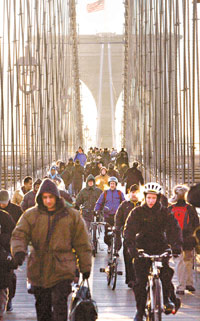|
Transport strike brings New York to a halt
(AP)
Updated: 2005-12-21 06:52
New York commuters trudged through the freezing cold, rode bicycles and
shared cabs Tuesday as New York's bus and subway workers went on strike for the
first time in more than 25 years and stranded millions of riders at the height
of the Christmas rush. A judge slapped the union with a $1 million-a-day fine.

Commuters cross the
Brooklyn Bridge on foot and bicycle during the morning rush-hour Monday in
New York City. [AFP] | State Justice Theodore
Jones leveled the sanction against the Transport Workers Union for violating a
state law that bars public employees from going on strike. The city and state
had asked Jones to hit the union with a "very potent fine."
"This is a very, very sad day in the history of labor relations for New York
City," the judge said in imposing the fine.
The union said it would immediately appeal, calling the penalty excessive.
The strike over wages and pensions came just five days before Christmas, at a
time when the city is especially busy with shoppers and tourists.
The heavy penalty could force the union off the picket lines and back on the
job. Under the law, the union's 33,000 members will also lose two days' pay for
every day they are on strike, and they could also be thrown in jail.
The courtroom drama came midway through a day in which the walkout fell far
short of the all-out chaos that many had feared. With special traffic rules in
place, the morning rush came and went without monumental gridlock. Manhattan
streets were unusually quiet; some commuters just stayed home.
The nation's biggest mass-transit system ground to a halt after 3 a.m., when
the TWU called the strike after a late round of negotiations with the
Metropolitan Transportation Authority broke down. The subways and buses provide
more than 7 million rides per day.
New Yorkers car-pooled, shared taxis, rode bicycles, roller-skated or walked
in the freezing cold. Early morning temperatures were in the 20s. Mayor Michael
Bloomberg, who said the strike would cost the city as much as $400 million a
day, joined the throngs of people crossing the Brooklyn Bridge by foot.
"Hey, can I get a ride?" Jay Plastino asked a neighbor near his home in the
northern tip of Manhattan. Plastino, who was headed to his midtown job, was
angry at the union: "This is a big city. Don't they realize that?"
Gov. George Pataki said the union acted illegally and "will suffer the
consequences." But union attorney Arthur Schwartz accused the MTA of provoking
the strike.
No negotiations were scheduled between the two sides, although a union lawyer
planned to meet with three mediators.
It was the city's first transit strike since an 11-day walkout in 1980. The
effect this time, however, was tempered by the advent of personal computers,
which enabled many commuters to stay home and work via the Internet.
Others boarded water taxis along the Hudson River, or jumped into carpools.
Many lined up in the cold to await private buses arranged by their employers, or
shared yellow cabs with perfect strangers. There was a flat $10 fee for cab
riders.
"The city is functioning, and functioning well considering the severe
circumstances," the mayor said. The TWU "shamefully decided they don't care
about the people they work for, and they have no respect for the law. Their
leadership thuggishly turned its back on the New York City. This strike is
costing us."
Jack Akameiza, 66, was trying to figure out a way to get from Manhattan to
Coney Island. "I cannot go to work," he said. "I cannot take care of my family."
Some commuters were upset at the union, others with management. Some, as they
made their way to work, blamed both sides.
"It's two arrogant groups not caring that 7 million people are
inconvenienced," said Kenny Herbert, 45, of Brooklyn, who took the train to work
Monday night but needed a water taxi across the East River to get home.
The International TWU, the union's parent, had urged the local not to strike.
The first day of the strike was expected to cost the city $400 million in
revenue, with an additional loss of $300 million per day afterward, according to
the city comptroller's office. Countless stores and restaurants were affected.
The mayor put into effect a sweeping emergency plan, including a requirement
that cars entering Manhattan below 96th Street have at least four occupants.
The union said the latest MTA offer included annual raises of 3 percent, 4
percent and 3.5 percent. Pensions were another major sticking point in the
talks, particularly involving new employees.
Union local president Roger Toussaint said the union wanted a better offer
from the MTA, especially when the agency has a $1 billion surplus this year.
The contract expired Friday at midnight, but the two sides had continued
talking through the weekend.
|